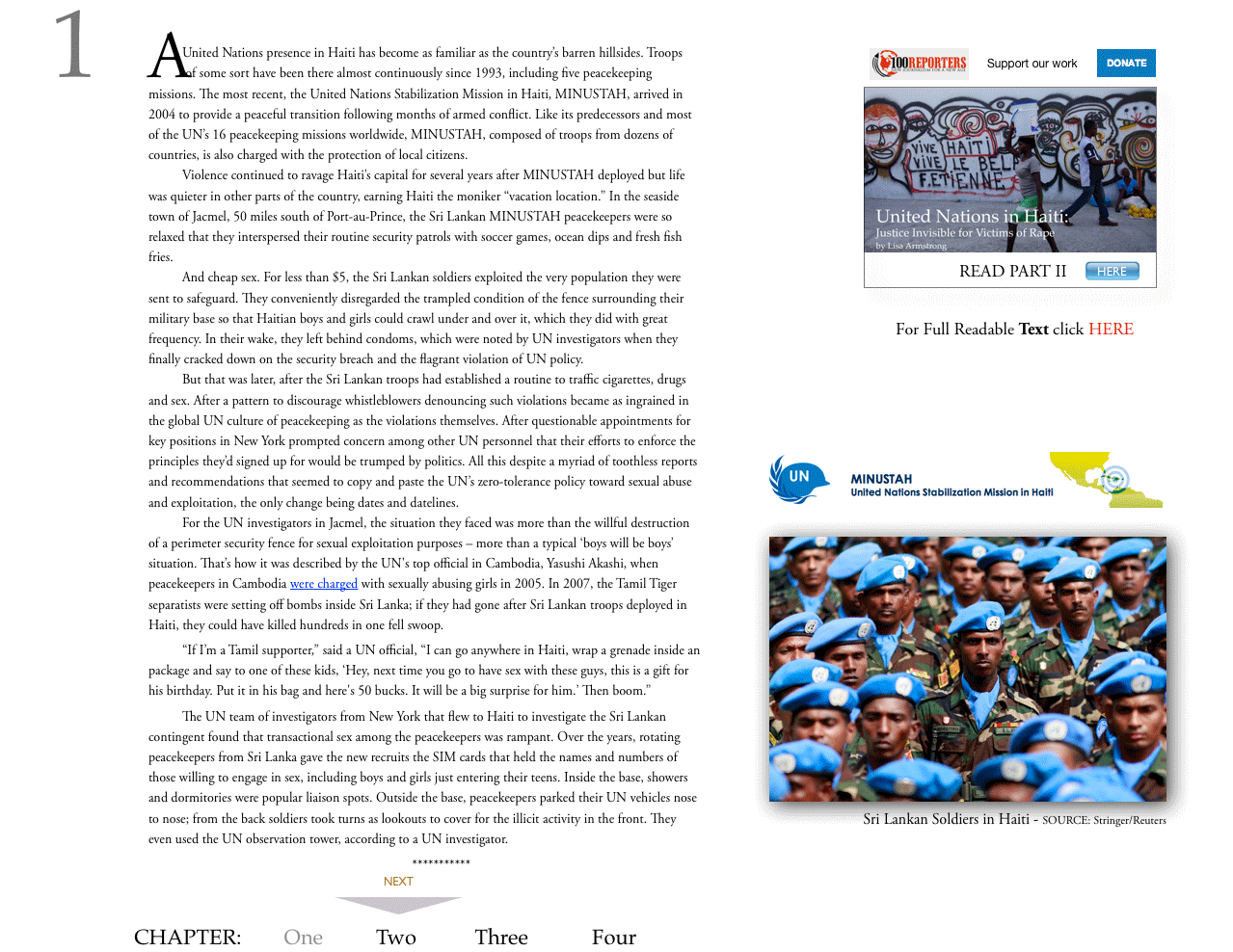

A United Nations presence in Haiti has become as familiar as the country’s barren hillsides. Troops
of some sort have been there almost continuously since 1993, including five peacekeeping missions. The most recent, the United Nations Stabilization Mission in Haiti, MINUSTAH, arrived in 2004 to provide a peaceful transition following months of armed conflict. Like its predecessors and most of the UN’s 16 peacekeeping missions worldwide, MINUSTAH, composed of troops from dozens of countries, is also charged with the protection of local citizens.
Violence continued to ravage Haiti’s capital for several years after MINUSTAH deployed but life was quieter in other parts of the country, earning Haiti the moniker “vacation location.” In the seaside town of Jacmel, 50 miles south of Port-au-Prince, the Sri Lankan MINUSTAH peacekeepers were so relaxed that they interspersed their routine security patrols with soccer games, ocean dips and fresh fish fries.
And cheap sex. For less than $5, the Sri Lankan soldiers exploited the very population they were sent to safeguard. They conveniently disregarded the trampled condition of the fence surrounding their military base so that Haitian boys and girls could crawl under and over it, which they did with great frequency. In their wake, they left behind condoms, which were noted by UN investigators when they finally cracked down on the security breach and the flagrant violation of UN policy.
But that was later, after the Sri Lankan troops had established a routine to traffic cigarettes, drugs and sex. After a pattern to discourage whistleblowers denouncing such violations became as ingrained in the global UN culture of peacekeeping as the violations themselves. After questionable appointments for key positions in New York prompted concern among other UN personnel that their efforts to enforce the principles they’d signed up for would be trumped by politics. All this despite a myriad of toothless reports and recommendations that seemed to copy and paste the UN’s zero-tolerance policy toward sexual abuse and exploitation, the only change being dates and datelines.
For the UN investigators in Jacmel, the situation they faced was more than the willful destruction of a perimeter security fence for sexual exploitation purposes – more than a typical ‘boys will be boys’ situation. That’s how it was described by the UN's top official in Cambodia, Yasushi Akashi, when peacekeepers in Cambodia were charged with sexually abusing girls in 2005. In 2007, the Tamil Tiger separatists were setting off bombs inside Sri Lanka; if they had gone after Sri Lankan troops deployed in Haiti, they could have killed hundreds in one fell swoop.
“If I’m a Tamil supporter,” said a UN official, “I can go anywhere in Haiti, wrap a grenade inside an package and say to one of these kids, ‘Hey, next time you go to have sex with these guys, this is a gift for his birthday. Put it in his bag and here's 50 bucks. It will be a big surprise for him.’ Then boom.”
The UN team of investigators from New York that flew to Haiti to investigate the Sri Lankan contingent found that transactional sex among the peacekeepers was rampant. Over the years, rotating peacekeepers from Sri Lanka gave the new recruits the SIM cards that held the names and numbers of those willing to engage in sex, including boys and girls just entering their teens. Inside the base, showers and dormitories were popular liaison spots. Outside the base, peacekeepers parked their UN vehicles nose to nose; from the back soldiers took turns as lookouts to cover for the illicit activity in the front. They even used the UN observation tower, according to a UN investigator.